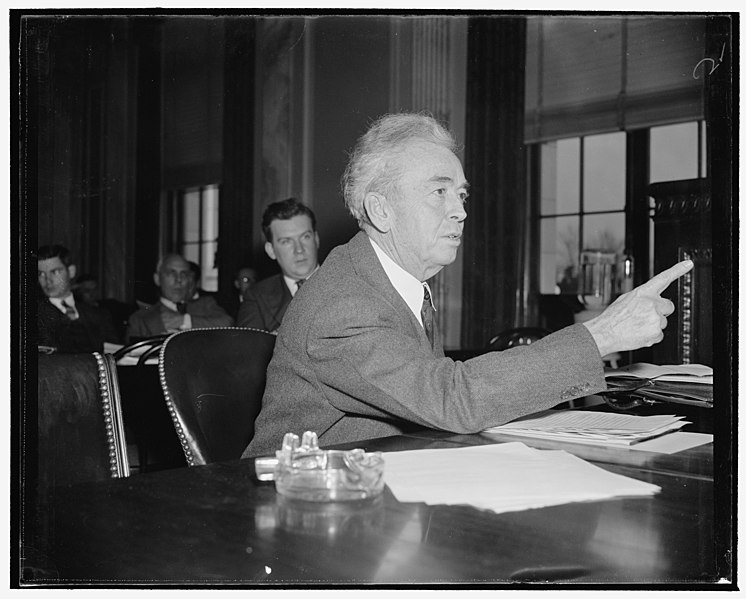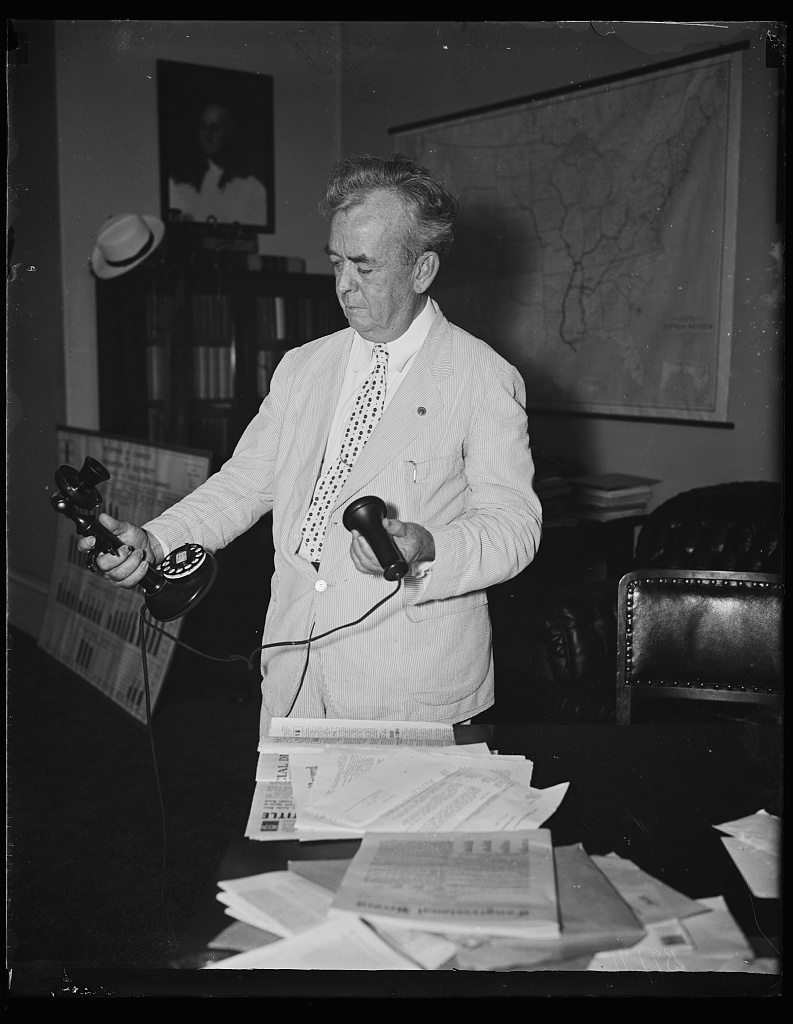We express concern about fringe, controversial characters entering Congress in recent years. In combating extremism in politics, it might be useful to look at an example of one representative in the halls of Congress, who served for more than thirty years in the mid-20th Century and was particularly notable with his blatantly antisemitic rhetoric.
His name is John Elliott Rankin. Among the things that can be found on his resume of antisemitism include using the k-word slur and decrying the “international Jewish bankers” and communist Jews. While speaking on the floor of the House he claimed that the Rothschilds “got financial control of England.” The Jewish Telegraphic Agency, when reporting his election defeat, noted that he sought a Congressional investigation into the Anti-Defamation League and opposed the Nuremberg trials.
One full-page election advertisement for his failed senate campaign, which appeared in the Lexington Advertiser, proudly declared Rankin a supporter of white supremacy. The Southern Jewish Weekly described Rankin as “the bane of existence of every one of the handful of Jewish Congressmen.”

Rankin’s long tenure in Congress came with many instances of him causing trouble for his colleagues. According to the New York Herald Tribune, in 1926 he threw an ink bottle at an attorney during a committee hearing, injuring him and causing ink to splash everywhere. In 1945, on the House floor, Michigan Democrat Frank Hook called Rankin a “dirty liar” (possibly with a worse adjective), prompting a furious Rankin to physically attack Hook until he was restrained.
In 1941, in the midst of World War II, Time reported a speech Rankin delivered in Congress raving about how “Wall Street and a little group of our international Jewish brethren are still attempting to harass the President…and the Congress of the United States into plunging us into the European war.”

Morris Michael Edelstein, a Jewish Democratic representative from New York, stood up and heroically rebuked Rankin’s antisemitism, saying that “I deplore the idea that…men in this House…attempt to use the Jews as their scapegoat. I say it is unfair and I say it is unAmerican.” He concluded by saying “all men are created equal, regardless of race, creed or color, and whether a man be Jew or Gentile, he may think what he deems fit.” Edelstein then left the House chamber and just a few minutes later tragically collapsed and died.
Rankin expressed regret after Edelstein’s death. Per the Chicago Daily Tribune, when eulogies were delivered in the House chamber Rankin was seen “shielding his face.” He called Edelstein “a good man, a good citizen, and a worthy representative of his district.”
Journalist John Roy Carlson details his interview with Rankin in his book Under Cover: My Four Years in the Nazi Underworld of America. In his talk with Carlson, Rankin continued with his antisemitism: “there is only one way to win this fight and that is to expose the international Jewish bankers as the war mongers. Tell the people that it is the Jews who want war.”
An active member of the House Un-American Activities Committee (even alongside Richard Nixon in the 80th Congress), Rankin was also a fierce and paranoid anti-communist. As his obituary in the New York Times puts it, “he professed to see a Communist plot behind everyone and everything he disagreed with.”
To be sure, Rankin was no ordinary Congressman, and it would be unfair to suggest the “great American earache,” as he was nicknamed, spoke for the House of Representatives during that period. But had Rankin been elected today, he would receive a lot more pushback from colleagues than he did in his time. When Rankin was not called out for using the k-word in the House chamber, writer Al Segal of the Seven Arts Feature Syndicate noted in 1944 that he was “disturbed by this but not frightened.”

If anything, Segal argues, troublesome people like Rankin demonstrate “democracy’s vigor.” Ultimately, “there always will be Rankins,” but they can be restrained “by a vigilant public exercising wisely its suffrage.” This argument remains very relevant today. With voters who know what they are doing — yes, this puts more responsibility on us — your choice extreme politician could very well remain at the edge.
It might be argued that Rankin’s example depicts today’s extremists as less toxic, showing a time when rhetoric was at one point far worse. However, one could also maintain that, rather, the ideas might be the same today — it is the language that has changed.
Nowadays we are thankfully able to swiftly expose and rebuke more blatant, Rankin-style antisemitism (it seems Kanye West did not get that memo). As Dave Chappelle put it in his controversial Saturday Night Live monologue, “I learned that there are two words in the English language that you should never say in sequence, and those words are ‘the’ and ‘Jews.’ Never heard someone do good after they said that.”
But as language evolves, so does the rhetoric of racism and antisemitism. I am not suggesting that certain language is always linked with antisemitism, but when extremists rant about “global elites” or rave about Israel controlling the world, this may be reminiscent of Rankin-style ranting about the international Jew.
So while on the quest to ensure that extreme and antisemitic politicians remain on the fringe, we need to take a step back and check to see if certain complaints might be sincere, or just the old bigotry of antisemitism taking another guise.